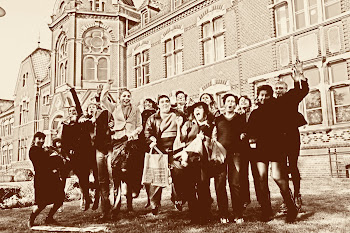They
stormed the Bastille in Egypt yesterday. Europe barely noticed.
That is, citizens forced their way into the secret police headquarters. They seized documents, went through the locations of detention and torture. It's a moment of incredible importance in any revolution -- the point at which you know the regime isn't just going to see a change of personnel at the top, but will lose some of its power to repress the population. It's
Paris 1789, or
Berlin 1990 -- moments of both emotional and historical importance.
So I'm left here with a surplus of emotion, asking myself how such an obviously iconic and affecting moment of history could have entirely overlooked. Hence the below splurge. Sorry if it doesn't make sense, but I realized I was heading down a blind alley of introspection, so decided not to spend too much time on it.
Can Butler help? The discussion of emotion in the first chapter of Frames of War can't. It
almost connects to the current situation, but makes itself irrelevant by being concerned only with emotion about individual human lives and deaths. There's some of that -- Egyptians finding documents about themselves, visiting places where they were once imprisoned or detailed. But the actors in this drama aren't individuals. They're crowds, institutions, historical events and patterns. So they're outside Butler's framework of affect.
The discussion of time and historical patterns, though, has more to say. Butler cites Benjamin:
the awareness that are about to make the continuum of history explode is characteristic of the revolutionary classes at their moment of action
Marx more famously phrases it thus:
The tradition of all past generations
weighs like an alp upon the brain of the living. At the very time when
men appear engaged in revolutionizing things and themselves, in bringing
about what never was before, at such very epochs of revolutionary crisis
do they anxiously conjure up into their service the spirits of the past,
assume their names, their battle cries, their costumes to enact a new
historic scene in such time-honored disguise and with such borrowed
language
The Bastille comparison isn't mine. It's from
Mahmoud Salem, an Egyptian blogger important both within Egypt and as a bridge to the English-speaking world. And its triple character fits the source. It's a rallying-call. It's an interpretation for the participants, a means o placing them inside a historical constellation, and a way of communicating with an anglophone world more emotional about revolutions of the past than thos eo the present.
---
Through the events in Egypt, I'm getting a sense of something that's perhaps implicit in Butler -- a relation between time, emotion and community. I'm living in a historical constellation where events in North Africa are now making a massive turning point in history. Berlin as a whole (with honorable exceptions) isn't. That difference, that fact we're living different historical epochs, has two components. First, a different allocation of emotions. I feel engaged, inspired, educated by the current revolutions -- not through grief for their deaths (sorry Butler) but through celebration of their actions. Second, different historical constellations, a different sense of what matters, what is the stuff of history. Does the conscience stop at the boundary of Germany, or the boundary of Europe? And the sense of shared time and shared emotion is the foundation for a community.
-- Dan


